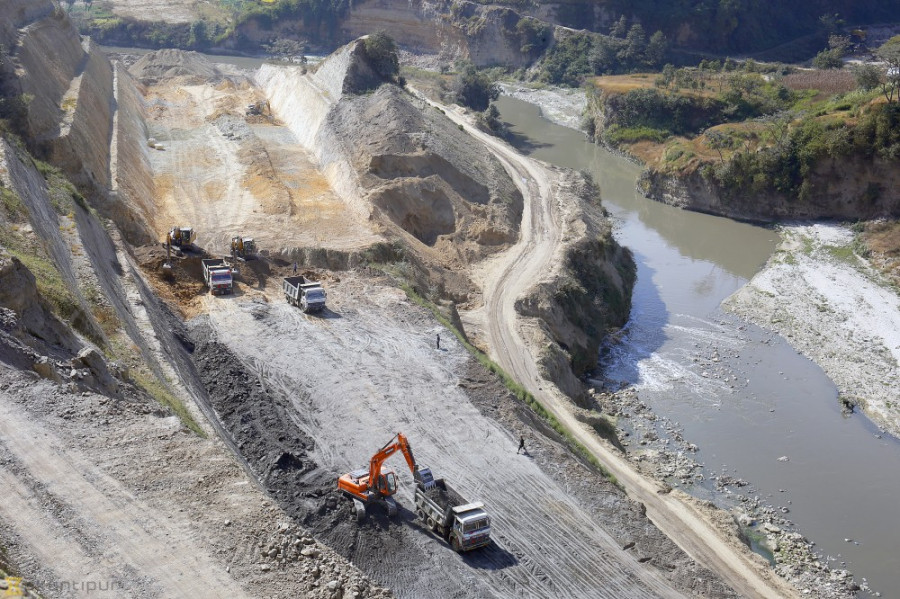National
Physical Infrastructure Ministry’s interest in Kathmandu-Tarai expressway is delaying DPR endorsement
Sources say Minister Mahaseth wants his say in the construction of the multibillion-rupee project
Binod Ghimire
Even though the Nepal Army submitted the detailed project report of the Kathmandu-Tarai expressway to the Cabinet in the third week of March, the government is yet to endorse it, creating difficulties for the national defence force to expedite the construction process.
Now those familiar with the project say Minister for Physical Infrastructure and Transport Raghubir Mahaseth’s interest in the project is delaying the process.
The 72.5 km expressway, which upon completion will drastically shorten travel time between Kathmandu and the Tarai, is a national pride project and its completion deadline is less than two years away.
Mahaseth is not happy that the Nepal Army has been given the sole authority to construct the multibillion-rupee project, as he wants his ministry’s involvement in the construction process, sources familiar with the developments since the submission of the detailed project report told the Post.
“The report would have been approved long ago had the Physical Infrastructure Ministry not intervened,” an official at the Ministry of Defence told the Post on condition of anonymity because he feared being dragged into a controversy.
After the detailed project report, prepared by a Korean company, was submitted to the Cabinet, it was sent to the Department of Roads, an agency under the Physical Infrastructure Ministry, for the technical study.
According to the source at the Defence Ministry, the road department hasn’t pointed out any flaws—in the alignment nor the structure. “It has complaints only about the terminologies used in the report,” said the official, stopping short of giving more details.
Officials at the secretariat of the expressway project office say though the escalated cost has been given as the reason for the delay, the interest from the Physical Infrastructure Ministry has delayed the approval.
The detailed project report prepared by the Soosung Engineering and Consulting has estimated the project cost at Rs 213 billion, which is Rs 80 billion more than what was projected by an Indian consortium of Infrastructure Leasing and Financial Services Transportation Networks, IL&FS Engineering and Construction, and Suryavir Infrastructure Construction.
The detailed project report by the Indian firm had estimated the construction cost at Rs 133.565 billion ($1.12 billion in current exchange rate) if it were to be built with a soft loan. The cost would have increased if it was a commercial loan.
Unlike the Korean firm’s estimate, it, however, didn’t include the cost for land acquisition, supervision and consulting charges. Following concerns over the increased cost, the Army said the project construction, excluding the contingency, would stand at Rs 185 billion, around Rs 50 billion higher than what was estimated by the Indian firm, which the Army said is because of an increase in the numbers and length of tunnels as well as inflation.
“The delay in the approval will ultimately hit the deadline which will defame the Army,” an official at the secretariat told the Post requesting anonymity because he was not allowed to speak to the media. “The Army chief himself has briefed the prime minister and the defence minister on the matter, but things have not moved forward,” the official at the secretariat told the Post.
The Post’s repeated attempts to reach Mahaseth for comments went unanswered.
Rajeshwor Gyawali, spokesperson for the Physical Infrastructure Ministry, attributed the delay to the road department’s ongoing study of the report.
“The department has been studying the report for the last one and a half months,” said Gyawali.
Asked if the interest of the ministry had resulted in the delay in the approval of the project report, Gyawali said, “I have no idea.”
“In principle, the Physical Infrastructure Ministry oversees such projects,” Gyawali told the Post. “It’s but natural for the ministry’s subordinate agency to study the detailed project report.”
The Kathmandu-Nijgadh expressway was first conceptualised in the mid-90s. But it failed to take off for almost a decade and a half. Then in 2013, the government revived the project and two years later, the Indian consortium won the bid for the project in February 2015. But in October the same year, the Supreme Court ordered a halt to the preparations to award the project to the Indian developer. A year later, in December 2016, the government cancelled all agreements made with the Indian company to build the expressway. The government in the first week of May, 2017 decided to award the project to the Nepal Army.
But the Army did not have the detailed project report, as the Indian company refused to hand over its report, saying the amount offered was too low. The security agency then decided to award the contract to prepare a new Detailed Project Report to the Korean company in September last year.
Nepal Army officials say they are worried that the delay in the endorsement could push the completion deadline further.
“Despite our commitment, chances of the project being completed by the deadline are slim,” Brigadier General Bigyan Dev Pandey, spokesperson for the Army, told the Post.
***
What do you think?
Dear reader, we’d like to hear from you. We regularly publish letters to the editor on contemporary issues or direct responses to something the Post has recently published. Please send your letters to [email protected] with "Letter to the Editor" in the subject line. Please include your name, location, and a contact address so one of our editors can reach out to you.




 9.7°C Kathmandu
9.7°C Kathmandu














